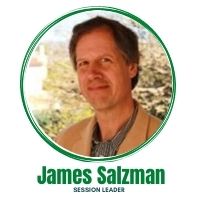SESSION 7: ECOSYSTEM SERVICE AND MARKET-BASED INSTRUMENTS
June 7, 2021 (Monday) - 10 to 11:30 AM MDT
This session has now taken place. Thank you to everyone who attended.
Session leader: James Salzman, University of California, Los Angeles
Many of the concepts developed in offsetting systems are transferable to other kinds of ecosystem service markets, opening up new possibilities of cost-effective conservation action. None, however, are free of controversy. This session will examine some of the leading thinking and experiences.
Presenters:
- James Salzman,University of California, Los Angeles Presentation
Paper: The global status and trends of Payments for Ecosystem Services - Carmen Cantuarias-Villessuzanne, Groupe ESPI Presentation
- Christopher Wally Wright, Puget Sound Institute Presentation
- Paige Olmsted, University of Ottawa Presentation
Paper: Investing in Nature - Scaling Conservation Finance in Canada for a Nature-Smart Economy - Gillian Kerr, Dalhousie University Presentation
This session has now taken place. Thank you to everyone who attended.
Summary report - download the full report (all the sessions in a written form)
VIEW THE RECORDING
BIOGRAPHIES:
 |
Session Leader: James Salzman James Salzman is the Donald Bren Distinguished Professor of Environmental Law with joint appointments at the UCLA School of Law and at the Bren School of the Environment at UC Santa Barbara. In twelve books and more than 100 articles and book chapters, his broad-ranging scholarship has addressed topics spanning drinking water, policy instrument design, trade, and ecosystem services. There have been over 100,000 downloads of his articles. He frequently appears as a media commentator and has lectured on environmental policy on every continent. Author of the first article on the legal and institutional issues in creating markets for ecosystem services, he has consulted on ecosystem service policies with governments in Australia, Canada, China, England, New Zealand, Vietnam, and other countries as well as the OECD, FAO and UNEP. He has served as a visiting professor at Columbia, Harvard, Stanford and Yale. |
 |
Presenter Gillian Kerr Gillian has worked within Alberta’s environment community for almost 20 years as an environmental consultant and with Alberta Environment and Parks. She completed both a masters and PhD focused on Alberta environmental issues. She completed a postdoctoral fellowship with McGill on ecosystem services in working landscapes and is currently doing a postdoc at Dalhousie University of perceptions of environmental change in Atlantic Canada. She has also been an avid volunteer in her inner-city community in Edmonton. Parks and outdoor spaces around Canada are her ‘church’. |
 |
Presenter: Carmen Cantuarias-Villessuzanne Carmen CANTUARIAS, Associate Professor in Economics at GROUPE ESPI, French Management School in Real Estate Market, in Paris. Her research topics are natural capital, non-renewable resource valuation, and nature in cities. She worked as a policy officer in Biodiversity and Economics at the French Ministry of Environment, implementing public policies of the Biodiversity Law: natural compensation sites (biodiversity banks), ecosystem services evaluation and biodiversity offsetting. In 2020, Carmen joined the scientific council of the French research program ITTECOP “The ecological and territorial functionalities of linear transport infrastructure". She also contributed to French and European projects where she performed cost-benefit analyses for new technologies in the sectors of energy and water. |
 |
Presenter: Christopher Wally Wright Christopher Wally Wright is a research scientist at the Puget Sound Institute at the University of Washington Tacoma in Tacoma, Washington State, USA. He analyzes existing programs and policies to support implementation of regional recovery plans and strategies. Areas of research interest include land development and restoration and the intersection of policy, ecosystem services, social science and ecology. Prior to joining the Puget Sound Institute, Chris has worked as a project manager and data analyst at a tech company, as a consultant at a Seattle-based global health foundation, as a research fellow at Project Drawdown, and as an analyst with the Washington State Department of Commerce. He holds an MPA from the Evans School of Public Policy and Governance at the University of Washington Seattle with graduate certificates in Environmental Management and International Development Policy. He has a BA from Lawrence University, Appleton, Wisconsin. |
 |
Presenter: Paige Olmsted Paige Olmsted is a Senior Research Associate at the Smart Prosperity Institute, based at the University of Ottawa, Canada. At SPI Paige leads the conservation finance initiative, examining financial mechanisms and enabling conditions to catalyze interest and investment to support ecosystem services and the natural environment. Her expertise centers around ecosystem services, nature-based solutions for climate change, ecological economics, and environmental and relational values. In this work and past positions at the Copenhangen Business School, Earth Institute in New York City and UNEP in Geneva, she enjoys working with a range of stakeholders to address conservation challenges — including local communities, NGOs, various scales of government, academia, and the private sector. She holds a PhD from the Institute of Resources, Environment and Sustainability at UBC and a Master’s of Environmental Science and Policy from Columbia University. |